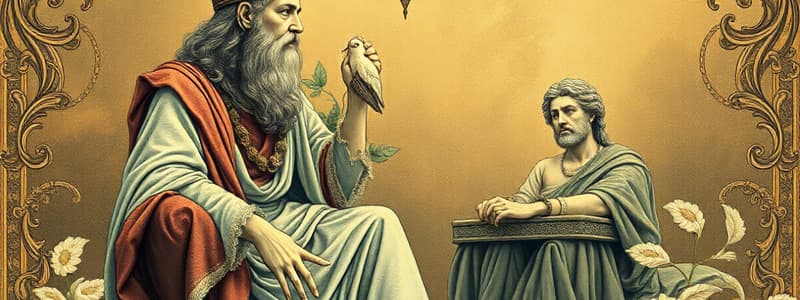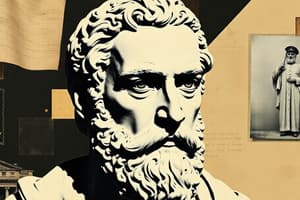Podcast
Questions and Answers
What is the central idea of Plato's concept of the philosopher-king?
What is the central idea of Plato's concept of the philosopher-king?
- Kings should be inherited through lineage.
- Philosophers are too detached from political matters.
- Rulers should be selected based on wealth and power.
- Only those who understand the Forms are fit to rule. (correct)
In Plato's ideal state, what role does education play?
In Plato's ideal state, what role does education play?
- It is essential for achieving harmony and virtue in society. (correct)
- It should be avoided to prevent questioning authority.
- It is only for the elite class.
- It is minimal, focusing only on practical skills.
How does Plato differentiate between the 'World of Forms' and the 'Physical World'?
How does Plato differentiate between the 'World of Forms' and the 'Physical World'?
- Only the Physical World can provide knowledge and truth.
- Both worlds are equally significant.
- The Physical World is more important for social governance.
- The Physical World is constantly changing, while the World of Forms is eternal and unchanging. (correct)
What is the significance of the Allegory of the Cave in Plato's philosophy?
What is the significance of the Allegory of the Cave in Plato's philosophy?
What does Plato propose regarding the concept of justice in a society?
What does Plato propose regarding the concept of justice in a society?
Flashcards
Plato's Ideal State
Plato's Ideal State
Plato's idea of a just society governed by philosopher-kings, with each individual fulfilling their role based on their natural abilities.
Theory of Forms
Theory of Forms
Plato's belief that true knowledge comes from understanding the Forms, eternal and unchanging essences that exist beyond the physical world.
Aristocracy
Aristocracy
A system of government where the most capable and virtuous individuals rule, motivated by reason and love of justice.
Plato's Criticism of Democracy
Plato's Criticism of Democracy
Signup and view all the flashcards
Importance of Education
Importance of Education
Signup and view all the flashcards
Study Notes
Challenging Questions on Plato's Political Thoughts
-
Plato's vision of the ideal state, while influential, is heavily criticized for its seemingly authoritarian aspects. Critics argue that his emphasis on philosopher-kings and strict social stratification could lead to the suppression of individual freedoms and dissent.
-
The concept of philosopher-kings raises questions about the feasibility and fairness of selecting rulers based solely on intellectual merit. Is there a reliable method to identify and assess true wisdom, and can individuals truly be separated into inherent classes?
-
Plato's dismissal of democracy is a significant source of contention. His critique argues that democracies lack the guidance of well-reasoned leaders and are susceptible to the manipulation of demagogues. However, modern interpretations of democracy often point to ways to mitigate these risks through institutional safeguards and informed citizenry, questioning the absolute validity of Plato's rejection.
-
The rigid social hierarchy proposed in Plato's Republic is deeply problematic from a modern perspective. His division of society into classes based on inherent abilities raises ethical concerns about equality and social mobility. Can inherent ability truly determine one's role in society, or is this a justification for societal inequalities?
-
The implications of Plato's theory of Forms for political governance remain complex and debated. If the ideal state is only a reflection of a higher, transcendent reality, does it make sense to even strive for a concrete implementation of this ideal? This philosophical abstraction potentially undercuts the practical application of political thought.
-
Plato's insistence on the importance of harmonious societal function, often enforced through stringent control, contrasts sharply with the value placed on individual autonomy in many modern political systems. How do we strike a balance between social order and individual freedom in a just society? Is Plato's heavy emphasis on order at the cost of freedom a genuine solution or an undesirable outcome?
-
Plato's concept of justice, closely intertwined with the ideal state, is also subject to criticism. Critics argue that his view of justice is too narrowly defined to encompass the complexities of human experience and interaction. Furthermore, how is justice achieved in practice if its form is not easily identifiable and susceptible to interpretation?
-
The practical application of Plato's ideas regarding censorship and control of knowledge presents significant challenges. How far should rulers be allowed to go in shaping public discourse and limiting freedom of expression? Is the suppression of certain ideas truly essential to maintain harmony, or does it stifle intellectual and creative growth?
-
Plato’s theory, while rich in philosophical insights, is often criticized for its lack of a nuanced approach to social and economic realities. The simplicity of his proposed solutions might prove insufficient to address the complexities and contradictions of actual human societies. Furthermore, do his ideas on social structures adequately recognize the economic and social disparities of his time and how they might relate to contemporary issues and challenges?
-
The question of applying Plato's ideas in a contemporary context is crucial. Can his ideals of justice, virtue, and the good life form a viable blueprint for 21st-century societies, or do his assumptions and proposals conflict with our modern values and experiences? The application of his ideas depends on the ability to contextualize them correctly, questioning their validity in their entirety or specific components.
Studying That Suits You
Use AI to generate personalized quizzes and flashcards to suit your learning preferences.




